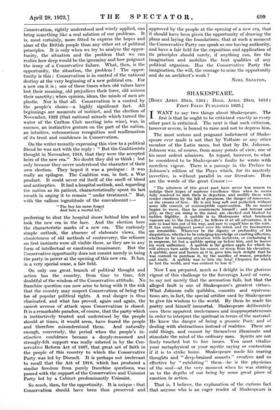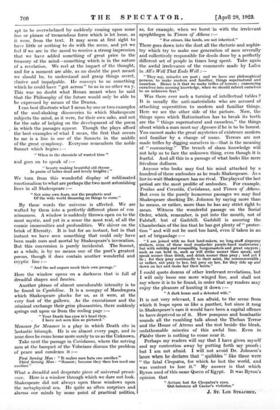SHAKESPEARE.
[BORN APRIL 23RD, 1564 ; DIED, APRIL 23RD, 1616 ; FIRST FOLIO PUBLISHED 1623.]
IWANT to say two things about Shakespeare. The -I- first is that he ought to be criticized exactly as every other poet is criticized. The next is that such criticism, however severe, is bound to raise and not to depress him.
The most serious and poignant indictment of Shake- speare- ever made is not that by Voltaire or any other member of the Latin races, but that by Dr. Johnson. Johnson was, of course, from many points of view, one of his most ardent admirers. In regard, however, to what he considered to be Shakespeare's faults he wrote with merciless vigour. There is a passage in the Preface to Johnson's edition of the Plays which, for its masterly invective, is without parallel in our literature. Hera are the words of the great Censor :- " The admirers of this great poet have never less reason to indulge their hopes of supreme excellence than when he seems fully resolved to sink them in dejection, and mollify them with tender emotions by the fall of greatness, the danger of innocence, or the .crosses of love. He is not long soft and pathetick without some idle conceit, or contemptible equivocation. He no sooner begins to move, than he counteracts himself ; and terrour and pity, as they are rising in the mind, are checked and blasted by sudden frigidity. A quibble is to Shakespeare what luminous vapours are to the traveller ; he follows it.at all adventures, it is sure to lead him out of his way, and sure to engulf him in the mire. It has some malignant power over his mind, and its fascinations are irresistible. Whatever be the dignity or profundity of his disquisition, whether he be enlarging knowledge or exalting affection; whether he be amusing attention with incidents, or enchaining it in suspense, let but a quibble spring up before • him, and he leaves his work unfinished. A quibble is the golden apple for which he will always turn aside from his career, or stoop from his elevation. A quibble, poor and barren as it is, gave him such delight that he was content to purchase it, by the sacrifice of reason, propriety and truth. A quibble was to him the fatal Cleopatra for which he lost the world, and was content to lose it."
Now I am prepared, much as I delight in the glorious vigour of this challenge to- the Sovereign Lord of verse, to say not merely that the accusation fails, but that the alleged fault is- one of Shakespeare's greatest virtues. What Johnson calls quibbles, conceits and equivoca. tions are, in fact, the special: artifice used by Shakespeare to give his wisdom to the world. By them he made his poetry and himself immortal_ Shakespeare deliberately uses these apparent irrelevances and inappropriatenesses in order to interpret the spiritual in terms of the material. He knew the danger of being a gnomic Poet; and of dealing with abstractions instead of realities. These are cold things, and cannot by themselves illuminate and stimulate the mind of the ordinary man. Spirits are not finely touched but to fine issues. You must vitalize your metaphysical or your mystic saying or contention if it is to strike home. Shakespeare made his soaring thoughts and " deep-brained sonnets " creative and so effective by " exhibiting " them—he is the physician of the soul—at the very moment when he was stirring us to the depths of our being by some great piece of emotion in action.
That is, I believe, the explanation of the curious fact that anyone who is an eager reader of Shakespeare is apt to be overwhelmed by suddenly coming upon some line or phrase of tremendous force which is let loose, as it were, from the text. It may seem at first sight to have little or nothing to do with the scene, and yet we feel if we are in the mood to receive a strong impression that we have added something of great price to the treasury of the mind—something which is in the nature of a revelation. We reel at the impact of the thought, and for a moment are able, as no doubt the poet meant we should be, to understand and grasp things secret, elusive and impalpable. He conveys to us something which he could have "got across" to us in no other wa y. This was no doubt what Renan meant when he said that the Philosophy of the future would only be able to be expressed by means of the Drama.
I can best illustrate what I mean by one or two examples of the soul-shaking discoveries to which Shakespeare subjects the mind, as it were, for their own sake, and not for the sake of helping on the development of the poem in which the passages appear. Though the plays afford the best examples of what I mean, the first that occurs to me is a line in one of the Sonnets in the middle of the great symphony. Everyone remembers the noble Sonnet which begins :- " When in the chronicle of wasted time " and goes on to speak of :— " beauty making beautiful old rhyme
In praise of ladies dead and lovely knights ; "
We turn from this wonderful display of sublimated emotionalism to what are perhaps the two most astonishing lines in all Shakespeare :— " Not mine own fears, nor the prophetic soul
Of the wide world dreaming on things to come."
By these words the universe is affected. We are wafted by them into a perfectly different plane of con sciousness. A window is suddenly thrown open on to the most mystic, and yet in a sense the most real, of all the cosmic immensities and profundities. We shiver on the brink of Eternity. It is but for an instant, but in that instant we have seen something that could only have been made ours and mortal by Shakespeare's invocation. But this conversion is purely incidental. The Sonnet, as a whole, is by no means one of the poet's greatest poems, though it does contain another wonderful and cryptic line :- " And the sad augurs mock their own presage."
Here the window opens on a darkness that is full of dreadful shapes and fancies.
Another phrase of almost unendurable intensity is to be found in Cymbeline. It is a nosegay of Mandragora which Shakespeare plucks for us, as it were, at the very foot of the gallows. As the executioner and the criminal exchange their grim pleasantries, there suddenly springs out upon us from the reeling page :— " Your Death has eyes in's head then.
I have not seen him so pictured."
lleasure for Measure is a play in which Death sits in fantastic triumph. He is on almost every page, and in hone does he come home more surely to us as the Unknown.
Take next the passage in Coriolanus, where the serving men at the banquet of the Volseians discuss the problem of peace and condemn it :- First Serving Man : " It makes men hate one another."
Third Serving Man : "Reason ; because they then less need one another."
What a dreadful and desperate piece of universal presci- ence. Here is a window through which we dare not look. Shakespeare did not always open these windows upon the metaphysical sea. He quite as often surprises and alarms our minds by some point of practical politics, as, for example, when we burst' in with the irrelevant apophthegm in Timon of Athens :- " For crimes, like lands, are not inherited."
There goes down into the dust all the rhetoric and sophis- try which try to make one generation of men severally and collectively responsible for deeds done by a perfectly different set of people in times long spent. Take again the awful irrelevance of the comments made by Lafeu in All's Well That Ends Well :- " They say, miracles are past. ; and we have our philosophical persons, to make modern and familiar, things supernatural and causeless. Hence is it that we make trifles of terrors ; ensconcing ourselves into seeming knowledge, when we should submit ourselves to an unknown fear."
Was there ever such a turning of intellectual tables ? It is usually the anti-materialists who are accused of attaching superstition to modern and familiar things. Here we see the other side of the picture. Now, the things upon which Ratiocination has to break its teeth are the " things supernatural and causeless," the things about which a man must say Agnosco if he is to be honest. You cannot make the great mysteries of existence modern and familiar by a change of name. Terrors are not made trifles by digging ourselves in—that is the meaning of " ensconcing." The trench of sham knowledge will riot help us to face the unknown thing, even though it is fearful. And all this in a passage of what looks like mere frivolous dullness.
Anyone who looks may find his mind attacked by a hundred of these ambushes as he reads Shakespeare. As a Tier-in-wait Shakespeare has no rival. The plays of the last period are the most prolific of ambushes. For example, Troilus and Cressida, Coriolanus, and Timon of Athens. But even in the purely humorous passages we may find Shakespeare shocking Dr. Johnson by saying more than he means, or rather, more than he has any strict right to mean. Witness the wonderful passage on the Social Order, which, remember, is put into the mouth, - not of Falstaff, but of Gadshill. Gadshill is assuring the Chamberlain of the inn that he has got plenty of " protec- tion " and will not be used too hard, even if taken in an act of brigandage :— " I am joined with no foot land-rakers, no long-staff sixpenny strikers, none of these mad mustachio purple-hued maltworms ; but with nobility and tranquillity, burgomasters and great oneyers ; such as can hold in, such as will strike sooner than speak, and speak sooner than drink, and drink sooner than pray ; and yet I lie ; for they pray continually to their saint, the commonwealth ; or rather, not pray to her, but prey on her, for they ride up and down on her and make her their boots."
I could quote dozens of other irrelevant revelations, but I will only loose one more winged line, and shall not say where it is to be found, in order that my readers may enjoy the pleasure of hunting it down :— " A dark house and a detested wife."
It is not very relevant, I am afraid, to the scene from which it leaps upon us like a panther, but since it rang in Shakespeare's ears it would have been a capital offence to have deprived us of it. How pompous and bombastic sounds all the rumbling talk about the Theban Terror and the House of Atreus and the rest beside• the bleak, unfathomable miseries of this awful line. Even in Pisedre there is nothing to come near it.
- Perhaps my readers will say that I have given myself and my contention away by putting forth my proofs ; but I am not afraid. I will not avoid Dr. Johnson's lance when he declares that ".quibbles " like these were " the fatal Cleopatra, for which he lost the world, and was content to lose it." My answer is that which Byron used of this same Queen of Egypt. It was Byron's opinion that
" Actium lost for Cleopatra's eyes, Out-balances all Caesar's victories."
J. ST. LOE STRACHEY,.



















































 Previous page
Previous page